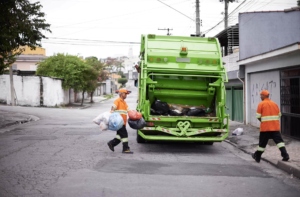Show Your Support For Environmental Protection On Earth Day
Earth Week is a week-long event held annually in April, dedicated to raising awareness and promoting sustainability practices. The week usually begins on April 16th and ends on April 22th. The theme for 2023 is Invest In Our Planet. This year, individuals, organizations, and governments worldwide will come together to take action to protect our planet and promote sustainable living. Will you?
Combining Aims For a Better Earth
The main aim of Earth Week is to increase awareness of environmental issues and encourage people to take steps to reduce their impact on the planet. Our objective at CheckSammy, too, is to resolve or mitigate the human waste problem. The human waste problem is created when trash products are not correctly disposed of and left to cause severe damage to the environment, animals, wildlife, and even public health.
According to Earthday.org, burning trash in landfills makes up 91% of all methane emissions. So, with this, not recycling is not an option. Some of how Earth Week and our team at CheckSammy promote sustainability and reduce human waste and trash include:
- Education: The promotion of education of individuals and organizations about environmental issues and the importance of sustainability.
- Action: The encouragement of people to take action to reduce their ecological impact, whether through small lifestyle changes or more significant initiatives.
- Advocacy: The encouragement of individuals and organizations to advocate for policies and initiatives that promote sustainability and protect the environment.
- Collaboration: The involvement of individuals, organizations, and governments to collaborate on sustainability initiatives and work towards a common goal.
- Recycling: The conscious effort to recycle appropriately.
Collaborating on Aims, And Collaborating at Events
During Earth Week, people can participate in many events and activities to promote sustainability. These include:
- Clean-up events: Communities clean up parks, beaches, and other public spaces to reduce litter and protect wildlife.
- Tree planting: Organizations and individuals plant trees to combat deforestation and help offset carbon emissions.
- Recycling programs: Schools, businesses, and communities organize recycling programs to reduce waste and promote sustainable practices.
- Energy-saving initiatives: Individuals and organizations take steps to reduce their energy consumption by turning off lights, using energy-efficient appliances, and utilizing renewable energy sources.
Enjoying Collaborative Efforts On Recycling on Earth Day
Earth Day is the perfect day to join recycling efforts. While individuals should be recycling every single day, on this particular day, actions should be increased. But how? Below are a few recycling best practices from EarthDay.org that we agree on:
- Avoid grocery bags that dissolve into harmful microplastics. Should they not dissolve, they’re ingested by animals, resulting in death. This Earth Day, take your plastic grocery bags to a drop-off area specifically for recycling or avoid using plastic bags altogether. Also, avoid bagging your other trash in plastic bags but instead throw them in your blue bin. Then, you’ll want to buy canvas bags and use these from now on when shopping.
- Don’t recycle anything smaller than a credit card, including bottle caps, coffee pods, straws, bottle caps, paperclips, and plastic cutlery. Be conscious of what you throw in the recycling bin and the effects these have on recycling equipment. Small plastic items are not generally sorted and tend to clog machines at the recycling and waste factories.
- Make sure your recyclable items are clean, empty, and dry to avoid food waste contamination and a fast track to landfills. In the U.S., food waste contaminates 25 percent of recycling loads. Therefore, it’s imperative to always clean or rinse off what you’re about to recycle and ensure these items are cleaned and dried.
- Always recycle similar products together, as recycling only works when materials are together. If trash items can’t be separated, they are considered trash and head to landfills. So, avoid buying non-recyclable materials that can’t be separated this Earth Day.
- Know how plastics are treated according to their resin code. With this, you can act accordingly when disposing of these. As an example, rigid plastics can be recycled, and they are identified by their resin codes 1-7. Plastics with a high number are generally less recyclable, so avoid them. In addition, take the time to check your city’s recycling website for the plastic code or number it takes.
- Stop wish-cycling and optimistically put non-recyclable objects in recycling bins, hoping they will get recycled. Instead, start learning and teaching yourself about recycling. Through this, you’ll effectively avoid contaminating loads of otherwise recyclable materials. It’s all about recycling consciously and adequately.
Celebrate Earth Week Every Day With CheckSammy
Promoting sustainable practices and raising awareness about environmental issues is a central goal of Earth Week. Working together can positively impact our planet and protect it for future generations. Contact us today about organics recycling, carbon offset solutions, and textile recycling.
See Our Services
Create a custom solution to meet your waste and sustainability goals. Contact us today!
Continue reading
Dive deeper into the CheckSammy Blog by reading one of our posts below
Feeling the Pain of Higher Resident Turnover? Apartment Junk Removal Can Help
If you’re a property manager, you’ve probably had a significant increase in tenant turnover over the last couple of years. So it’s no wonder apartment junk removal may be top of mind for you right now. There are several reasons for this shift. For one, the housing market is on fire right now. In 2020 […]
Read More About Feeling the Pain of Higher Resident Turnover? Apartment Junk Removal Can HelpSetting Up a Community E-waste Recycling Program
E-waste is the fastest-growing municipal waste stream according to the EPA, yet e-waste recycling isn’t keeping pace. In fact, only 12.5% of all e-waste is recycled, reports the EPA. Starting a community e-waste recycling program is a terrific way to ensure hazardous e-waste, like lithium-ion batteries, doesn’t end up in your community’s landfill. Creating an […]
Read More About Setting Up a Community E-waste Recycling ProgramWaste Management’s Role in the Circular Economy
Establishing a waste management program for your business or community is one of the best ways you can contribute to the circular economy. Here’s everything you need to know about waste management’s role in the circular economy (and how to get involved). What Is the Circular Economy? Our current economic model is all about taking […]
Read More About Waste Management’s Role in the Circular Economy5 Reasons to Consider a Textile Recycling Program for Your Organization
Americans sent more than 17 million tons of textiles to landfills in 2018, a volume that is only increasing every year, reports the Environmental Protection Agency. When you think about the fact that it can take over 200 years for textiles to decompose, it’s easy to grasp how large textile waste’s contribution is to the […]
Read More About 5 Reasons to Consider a Textile Recycling Program for Your Organization8 Benefits of Environmentally Friendly Power Washing Services
If you’re into maintaining the curb appeal of your business or home, then you’ve probably heard of pressure washing. Pressure cleaning involves using high-pressure water spray to remove grime, mold, dust, paint, mud, and other junk from objects or surfaces. Many people worry that pressure washing isn’t good for the environment, but this couldn’t be […]
Read More About 8 Benefits of Environmentally Friendly Power Washing ServicesWhy Our Customers Love Our Full-Service Junk Removal
If you’re looking for full-service junk removal services, you’ve come to the right place. CheckSammy is a one-stop shop for all your junk removal and sustainability needs. From our affordability, simplicity, and unrivaled turnaround times to our innovative sustainability solutions and patented technology and data, it’s clear why some of North America’s biggest companies choose […]
Read More About Why Our Customers Love Our Full-Service Junk RemovalTips for a Stress-Free Move From An Eco-Friendly Junk Removal Company
What does an eco-friendly junk removal company know about moving? Quite a lot, actually. Moving can be an especially chaotic time. You have to pack everything up, get rid of unwanted items, clean your property, load everything up, and move your things to your new location. That doesn’t even include the unpacking and resettling period. […]
Read More About Tips for a Stress-Free Move From An Eco-Friendly Junk Removal CompanyCollege Junk Removal Tips for Student Move-In Day
As the new school year gears up, colleges across the country are looking for ways to clean up their campuses before the new year begins, and many of them want to do so sustainably. College junk removal isn’t easy, though, especially around move-in week—and when trying to do so sustainably. As students move in and […]
Read More About College Junk Removal Tips for Student Move-In Day8 Items Hospitality Businesses May Not Know They Can Recycle
One hotel guest produces 2.5 pounds of trash every single day. Just a single hotel room produces around one cubic yard of waste each month, which totals 200 gallons of waste per room every month. Most of this waste goes straight to the landfill, even though research shows that up to 60% of it is […]
Read More About 8 Items Hospitality Businesses May Not Know They Can Recycle












